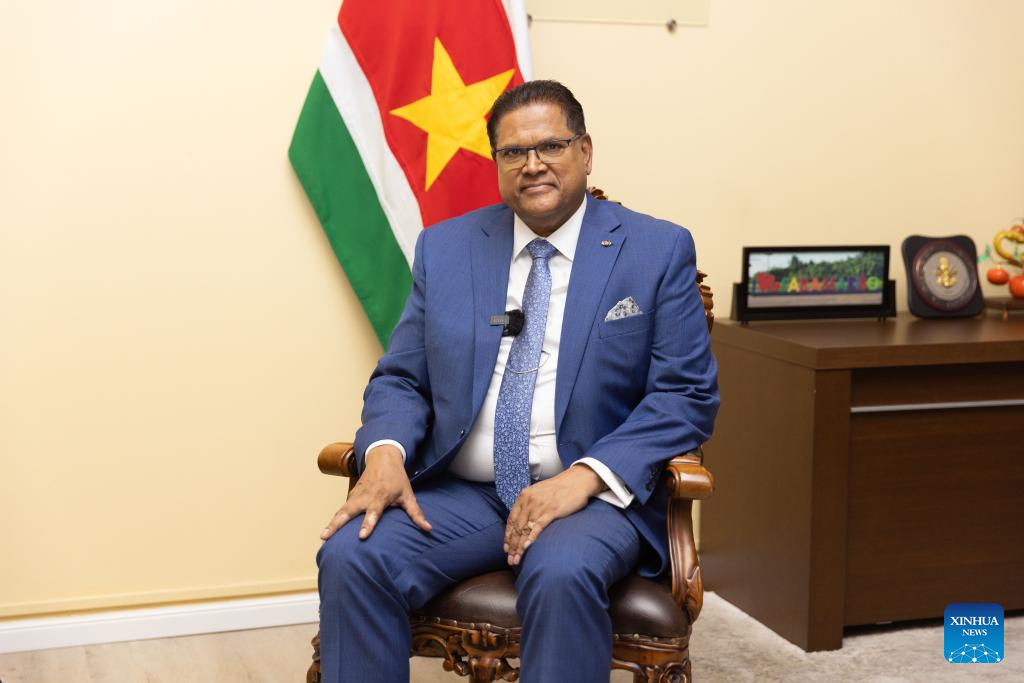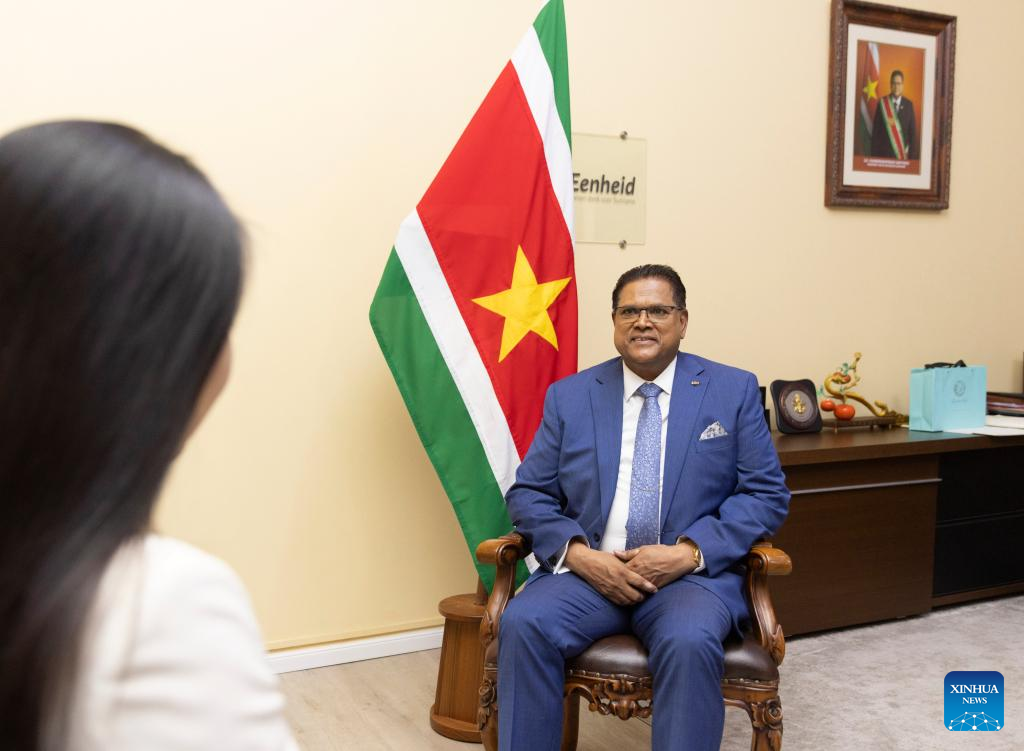
Chandrikapersad Santokhi, president of the Republic of Suriname, poses for a photo during an exclusive interview with Xinhua in Paramaribo, Suriname, April 4, 2024. (Xinhua/Li Mengxin)
by Xinhua writers He Bing, Wang Zhiying and Wang Linyuan
PARAMARIBO, April 10 (Xinhua) -- "We could move the bilateral relations between Suriname and China to the next level, strengthening cultural cooperation, business cooperation and investment cooperation," said Chandrikapersad Santokhi, president of the Republic of Suriname.
Santokhi made the remarks in an interview with Xinhua in the capital Paramaribo ahead of his state visit to China, during which he expressed optimism about the enduring friendship and cooperation between Suriname and China. He added that his country would enhance its relationship with China in several areas.
Suriname is a Caribbean country, covering an area of approximately 160,000 square km with a population of over 600,000.
China is one of the major countries in the world, said Santokhi. "Even (though) we are a small country, Suriname and other Caribbean countries can learn a lot from China," he said.
In May 2018, Suriname signed a memorandum of understanding with China to jointly build the Belt and Road. Since then, the two countries have embarked on numerous mutually beneficial projects within the Belt and Road Initiative (BRI) framework, including airport roads, the Regional Hospital Wanica, and the Suriname Agricultural Technical Cooperation Center, among others.
"The BRI, proposed by (Chinese) President Xi Jinping, ... promotes connectivity, giving opportunity for all the partners to develop their infrastructure," Santokhi said.
Santokhi further said the connectivity brought by the BRI has also created bridges for regional economic development and cooperation, benefiting all participating countries.
"The initiative plays a comprehensive role in the area of investment and development, and it helps to strengthen partnership among countries and also develop intra-regional cooperation," Santokhi said.
Suriname is one of the earliest Caribbean countries to establish diplomatic relations with China, and in 2024, the two countries will celebrate the 48th anniversary of their diplomatic ties.
Santokhi reaffirmed Suriname's adherence to the one-China principle, emphasizing mutual respect for each other's independence, sovereignty, and territorial integrity.
Regarding regional multilateral cooperation, Santokhi expressed Suriname's willingness to closely interact and strengthen cooperation with China to practice multilateralism, stressing that the BRI can be implemented through the Community of Latin American and Caribbean States (CELAC) and the Community of Caribbean States (CARICOM) cooperation and also promotes the integration process of the region.
"The important part of this type of cooperation is promoting South-South cooperation, and based on this type of cooperation, we can also improve the connectivity between Latin American countries and China," said Santokhi.
Suriname, with its extensive marine protected areas and one of the highest forest coverage rates in the world, holds significant importance for global ecological balance.
In terms of environmental protection and climate change response, Santokhi emphasized that there are shared interests and cooperation opportunities between Suriname and China.
"Suriname is a carbon negative ranked country, but also a country with a very low-lying coastline and threatened by the impact of climate change through droughts in the interior. As a small country, we cannot address it alone," said Santokhi, mentioning that Suriname needs the cooperation of the world, and particularly technical assistance from China.
Furthermore, Santokhi positively evaluated the advancing Chinese modernization and high-quality development.
"I had attended one training session organized by the Communist Party of China, and there I got the first lesson on advanced socialism with Chinese characteristics," said Santokhi, noting that in the timeline of China, everything is based on a tailor-made program.
"We can learn a lot from China in the area of economic development, particularly in improving the welfare of the people," Santokhi added.
Since the arrival of the first batch of Chinese immigrants in 1853, the Chinese community has played a significant role in the Surinamese society. In 2014, the Chinese New Year was officially designated as a legal holiday in this Caribbean country. Santokhi, who is a fan of Chinese culture, noted his participation in various Chinese cultural events, including the anniversary of the first Chinese settlement in Suriname.
"The presence of the Chinese community is enriching the Surinamese culture," said Santokhi.
Santokhi's state visit to China is scheduled for April 11 to 17. When asked about his plans and expectations for the visit, Santokhi highlighted the enormous cooperation potential between Suriname and China in infrastructure, agriculture, forestry, and energy, among others.
During his state visit to China, "three to four days are only reserved for the investment community, for the private sector, for companies," said Santokhi, aiming to promote more Chinese investment in Suriname and strengthen bilateral cooperation. Enditem
(Xinhua reporter Li Mengxin also contributed to the story.)

Chandrikapersad Santokhi, president of the Republic of Suriname, speaks during an exclusive interview with Xinhua in Paramaribo, Suriname, April 4, 2024. (Xinhua/Li Mengxin)



